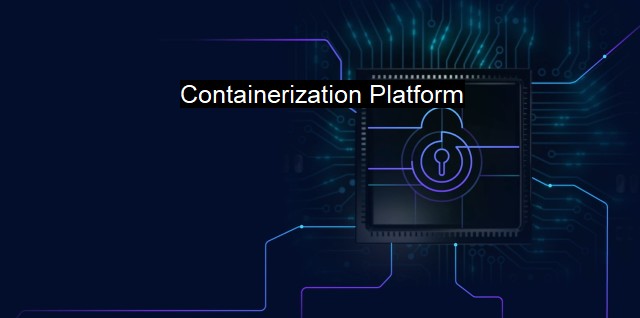What is Containerization Platform?
Securing Your Enterprise with Containerization: An Accelerated and Secure Approach to Application Management
Containerization platform is a technology that is quickly changing the landscape of information technology, development, and cybersecurity. Leveraging the concept of virtualization, containerization allows applications to be developed, packaged, and deployed in an isolated and secure way.In basic terms, a containerization platform can be equated to a shipping container in the logistics industry. A shipping container has standard specifications which enable it to be loaded, shipped, and unloaded anywhere in the world, regardless of the contents. In the same way, a containerization platform is a standard unit of software that packages application code and dependencies, making the application recognizable and runnable in any computing environment.
Fundamentally, containerization deconstructs the traditional understanding of system architecture. Rather than deploying applications on physical hardware or virtual machines, they are now placed within containers, providing a consistent and repeatable platform for applications to run, safely separated from other applications.
A key benefit of containerization from the cybersecurity perspective is isolation. Containers are isolated units, including everything that is required to run an application. This isolation prevents any potential security threats from spreading between applications, safeguarding the broader server and overarching infrastructure. All processes, file systems, and network stacks are separated, shielding each application from potential threats present in others. This makes containerization an effective method of countering multi-tenancy risks posed by traditional virtual machines.
Containerization platforms, like Docker or Kubernetes, provided the added advantage of integral security features, including automated security updates, vulnerability scanning, and strict access controls. Containers can help organizations narrow their attack surface by restricting activities within confined spaces, making it more challenging for potential threats to gain access to valuable data. For instance, Kubernetes offers the powerful advantage of 'namespaces' which allow for logical separation of resources, further enhancing the cybersecurity posture.
Nonetheless, it is important to recognize that container technologies are not a panacea for security issues. Security in the context of containers also presents its unique challenges. Just like applications running on traditional infrastructure, applications in containers are vulnerable to security threats. Cybercriminals may try to abuse privileges, exploit vulnerabilities in the application, or generally use containers for malicious activities. Taking stringent preventive measures, like employing solutions to actively monitor the behaviors of running containers, regular patching, efficient key management strategies, are critical to ensure constant security.
Interestingly, containerization also presents opportunities for improving antivirus measures. Modern antivirus solutions, previously designed to secure a significant amount of proprietary infrastructure, need to evolve rapidly to keep pace with the trends in containerization. These solutions must now secure a shared space, ensuring proper encryption, securing transmitted data, and responding promptly to threats while keeping overhead at a minimum. With the rise of containerization, the architecture of antivirus solutions thus needs to become lightweight, effective, easy to deploy, and auto-scalable.
Containerization platforms are a promising technology driving the progress of development and security methodologies within enterprises. While the evolution brings challenges, it also opens roads for innovation concerning cybersecurity measures and antivirus solutions. Organizations must be mindful to employ robust strategies for container security, keeping up with the platform updates, and ensuring efficient response times to potential vulnerabilities and cyber threats. In doing so, they can optimally leverage the possibilities containerization offers both for technological advancement and enhanced security.

Containerization Platform FAQs
What is a containerization platform in cybersecurity and antivirus?
A containerization platform is a technology that allows applications to run in isolated environments, known as containers. These containers provide a secure platform for running applications, protecting them from external threats or malicious activities. By using a containerization platform, cybersecurity and antivirus solutions can isolate risky applications, preventing them from affecting other applications or systems.How does containerization platform help in enhancing cybersecurity and antivirus?
A containerization platform simplifies system maintenance and updates by enabling applications to run in isolated containers. It also ensures that each container has only the necessary resources to run the application, reducing the system's vulnerability to threats. By isolating applications, a containerization platform can provide an additional layer of security for antivirus and cybersecurity software.What are the benefits of using a containerization platform in cybersecurity and antivirus?
A containerization platform provides many benefits for cybersecurity and antivirus, such as improved security, better performance, greater efficiency, and flexibility. Containerization platforms enable more reliable and secure deployments by providing isolation and resource allocation for each application, enabling better control over the environment. Containerization also allows for greater scalability, as applications can be deployed quickly and easily to meet changing requirements.Can a containerization platform guarantee 100% cybersecurity and antivirus protection?
While a containerization platform can provide additional layers of security and protection for your applications and systems, it cannot guarantee 100% protection. It is still necessary to use antivirus software and other security measures to ensure comprehensive protection against various types of threats. The containerization platform is just one tool in an overall strategy for cybersecurity and antivirus protection.| | A | | | B | | | C | | | D | | | E | | | F | | | G | | | H | | | I | | | J | | | K | | | L | | | M | |
| | N | | | O | | | P | | | Q | | | R | | | S | | | T | | | U | | | V | | | W | | | X | | | Y | | | Z | |
| | 1 | | | 2 | | | 3 | | | 4 | | | 7 | | | 8 | | |||||||